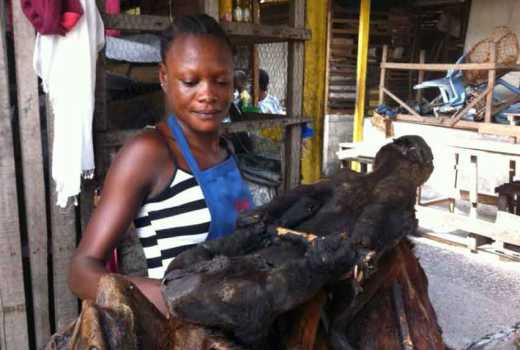
Anything from tortoise, snake and monkey meat is a mouth-watering delicacy that goes on the menu in Democratic Republic of Congo. That may sound nauseating, to East Africans, but Congolese have experimented with so much bush meat that it has become part of them.
Yet it comes at a deadly cost. In 2014, it cost them 49 lives when a rural bush hunter in Jeera, about 1,000km north of Kinshasa stumbled upon a dead monkey. It became part of the family dinner. Days later, the hunter, his wife and children were dead. Medical personnel who attended to them died later as well. It was the beginning of another Ebola outbreak in DRC.
Since then, Congolese have become wary about game meat, but they just haven’t stayed away from it. “It is our way of life...customers did not stop buying when Ebola broke out,” says Mama Jeanette Elofa, 53, who has operated a market stall since 1988.
When the Ebola outbreak was reported, game meat suddenly was not as popular at Marche de libertie Market, built in 2003 to honour former President Laurent Kabila. On a busy day, hundreds of residents flock to the market to buy food.
The shopping list includes game meat brought into the city from the south and North of the country. To a visitor in Kinshasa, the display can leave you dealing with culture shock. There is the stunning sight of charcoal grilled snake, monkey meat or antelope meat laid out for customers to sample.
Game meat, which is sold by part not in kilos can fetch from $15 (Sh1,320) at the low to a high of $30(Sh2,640) while tortoise meat can fetch $10(Sh880). When cut up, each of the piece of flesh for sale can average about a kilo a piece just by visually judging. There is no weighing scale in sight.
Mama Elofa’s stall can get pretty busy, especially on weekdays. On a good week, she can collect $1,000(Sh88,000) cementing the vibrancy of the business. Or as the Congolese like to say, it accentuates “Lokasa na mbongo” (the flow of money).
But that flow, for many stall owners, was rudely interrupted when the Ebola outbreak was reported last August in DRC. Suddenly, the customers vanished and tonnes of game meat lay at the market uncollected by consumers.
“Before the outbreak, we could sell eight or nine monkeys a day. Since then, we sell much less. We don’t have Ebola in Kinshasa and our families are starving,” says Mama Maggie Noseka, 50. She claims reports on Ebola have ruined their business.
The Ebola outbreak has complicated the menu option for many Congolese and they have to balance between popular delicacy and their health. It is a fact that concerns even the DRC Health minister Dr Felix Kabange.
“Makaka (monkey meat) is a delicacy among residents. But we have to encourage them to roast the meat first before bringing it to the market. The exposure to heat eliminates the presence of Ebola virus in the meat,” he says.
But education on the deadly virus has gone a notch higher in markets of Kinshasa, the country’s largest arena for game meat. It has included public announcements through loudspeakers around the market. Even the most dingy market has a radio station run by government and discusses sex, personal health and Ebola, among other issues. This is attributed in part to why Ebola was kept out of Kinshasa, a nightmare scenario that would put at risk 12million residents.
Even so, when the news about Ebola was over and World Health Organization declared DRC Ebola free last November, meat customers were already trickling back to the stalls in search of their favourite game meat.
At the Kabila Market, Mama Maggie Noseka is already busy calling customers to her stall sprawling with a variety of bush meat. “I have eaten game meat since I was a child and have never fallen ill,” she says, a swarm of flies hovering over the sight of charcoal grilled monkey meat spread in front of her.
“I don’t fear Ebola, I have no relatives who have died of Ebola,” she says defiantly.”
But does she take preventive measures? “What preventive measures?” With that, she turns to a waiting customer who purchases a collection of roasted snakes.
Mafuta Roseli is a regular seller of game meat. She has a stock of four monkeys, which will fetch an average of $40 (Sh3,520). She says demand is high.
Another game meat dealer, Yangisa Ewayi, 55, wonders why anyone would stop buying game meat because of Ebola. He gets on average 100kg to 150kg a day of game meat from Bandundu and Bakongo. The market is a beehive of activity on any day. Besides game meat, Ebola notwithstanding, vegetables, clothes, shoes, dress materials find their way on the floor of stalls.
 The Standard Group Plc is a multi-media organization with investments in media
platforms spanning newspaper print
operations, television, radio broadcasting, digital and online services. The
Standard Group is recognized as a
leading multi-media house in Kenya with a key influence in matters of national and
international interest.
The Standard Group Plc is a multi-media organization with investments in media
platforms spanning newspaper print
operations, television, radio broadcasting, digital and online services. The
Standard Group is recognized as a
leading multi-media house in Kenya with a key influence in matters of national and
international interest.



